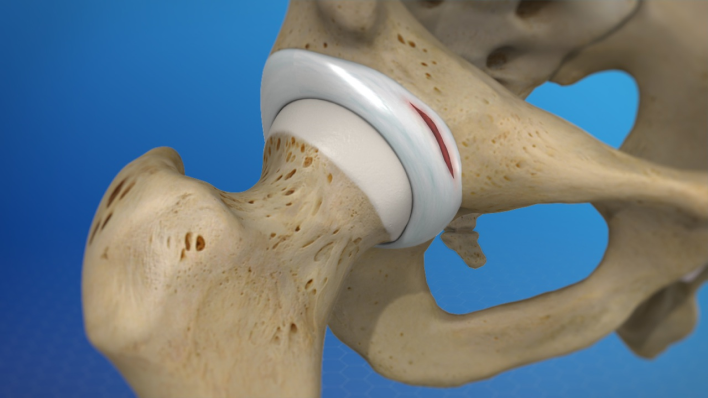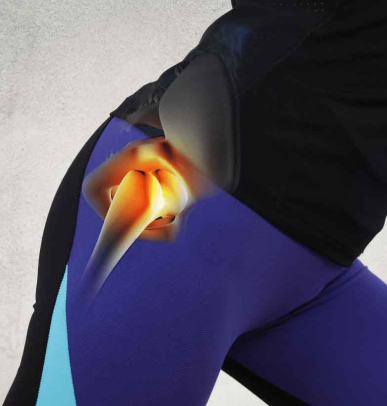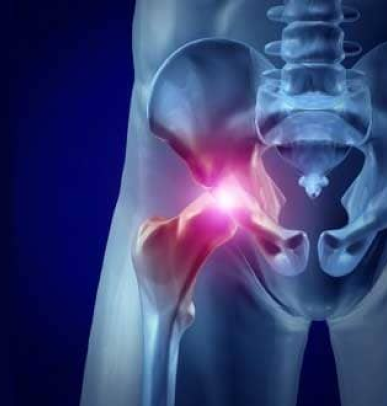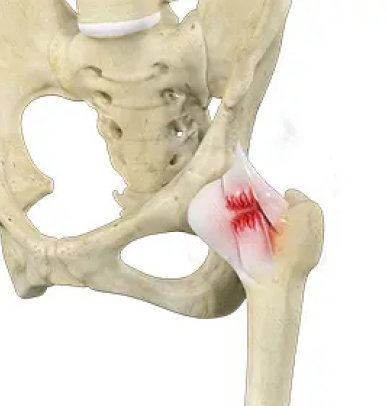Hip Ligament Injuries

Hip ligament injury refer to damage to the strong connective tissues surrounding the hip joint, leading to pain and restricted movement. At Tarabichi Joint Care in Dubai, we specialize in diagnosing and treating hip ligament injuries to help you regain function and relieve discomfort.
Whether you’ve sustained a hip sprain or a more severe ligament tear, our advanced treatments are designed to support your recovery and restore your quality of life.
Anatomy of the Hip Ligament
The hip joint is a ball-and-socket connection, where the femoral head (thigh bone) fits into the acetabulum (hip socket) of the pelvis. Key ligaments, including the iliofemoral, pubofemoral, and ischiofemoral ligaments, surround the joint and provide stability and control of movement.
These ligaments are crucial for proper alignment and range of motion, allowing activities like walking and running. However, when injured, they can cause hip instability, pain, and limited mobility.
Causes of Hip Ligament Injuries
- Trauma or Accidents
- Sports Injuries
- Overuse
- Age-Related Degeneration
Types of Hip Ligament Injuries

Hip Sprains

Hip Strains

Hip Ligament Tears
When Is Treatment for Hip Ligament Injury Recommended?
If you experience pain, swelling, bruising, or difficulty moving your hip joint, seeking medical attention is essential. Treatment is recommended if:
- The injury causes severe pain, instability, or inability to bear weight.
- Conservative treatments (rest, ice, medication) don’t relieve symptoms.
- There is a complete ligament tear or significant damage requiring surgery.
- Persistent pain or limited mobility affects daily activities.
Candidates Eligible for Hip Joint Ligament Injury Treatment
- Athletes or active individuals put stress on the hip joint.
- Older adults with ligament degeneration or weakened tissues.
- Those who have experienced accidents or falls causing hip ligament damage.
Hip Pain Treatment in Dubai
Non-Surgical Treatment Options
For mild to moderate injuries, we often recommend conservative treatments, including:
Rest and Ice Therapy: Resting the affected hip and applying ice can reduce inflammation and promote healing.
Physical Therapy: A customized rehab plan aimed at strengthening the muscles around the hip and enhancing flexibility.
Medications: Anti-inflammatory drugs or relievers can help manage pain and swelling during recovery.
Surgical Intervention
In cases of severe ligament tears or when conservative treatments fail, surgery may be necessary. Surgical options may include arthroscopic surgery in Dubai to repair or reconstruct the damaged ligament, allowing for faster recovery and less postoperative discomfort.
Regenerative Medicine for Hip Ligament Injuries
At Tarabichi Joint Care, we offer advanced regenerative treatments like PRP (Platelet-Rich Plasma) and BMAC (Bone Marrow Aspirate Concentrate) as non-invasive alternatives to surgery for healing hip ligament injuries.
PRP (Platelet-Rich Plasma): PRP involves drawing your blood, concentrating the platelets, and injecting them into the injured area. The growth factors in PRP stimulate soft tissue healing, making it practical for mild hip ligament injuries.
BMAC (Bone Marrow Aspirate Concentrate): For more severe ligament tears, BMAC uses stem cells from your bone marrow to promote faster healing. Stem cells are delivered to the damaged area to promote faster tissue repair.
Choose Tarabichi Joint Care for hip ligament injury in Dubai
At Tarabichi Joint Care in Dubai, our highly trained orthopedic specialists offer the latest diagnostic techniques and treatment options for hip ligament injuries. With a focus on personalized care, we ensure that each patient receives the most appropriate and effective treatment plan tailored to their condition.
Our state-of-the-art facilities and advanced treatment options provide a comprehensive approach to healing and Enhanced Recovery. If you’re experiencing hip pain or suspect a hip ligament injury, don’t wait for the care you need. Contact us today to schedule a consultation and take the first step toward recovery.
FAQ’S
The treatment plan is based on how severe the injury is. Conservative methods like rest, ice, and physical therapy are often sufficient for mild sprains. We may recommend advanced regenerative treatments or surgical procedures for more severe injuries. Hip arthroscopy in Dubai is sometimes performed to repair or remove damaged tissue.
Although rare, some complications may arise from treatment, especially if surgery is involved. These may include:
- Infection at the surgery site.
- Nerve damage or blood vessel injury.
- Prolonged recovery time or recurrence of symptoms.
- Stiffness or loss of range of motion.
Before your consultation, please bring the following documents:
- A list of any medications you’re currently taking, along with your relevant medical history.
- Imaging studies (X-rays, MRIs), if available]
- Insurance details (if applicable)]
- Any referral letters or previous treatment records from other healthcare providers]
